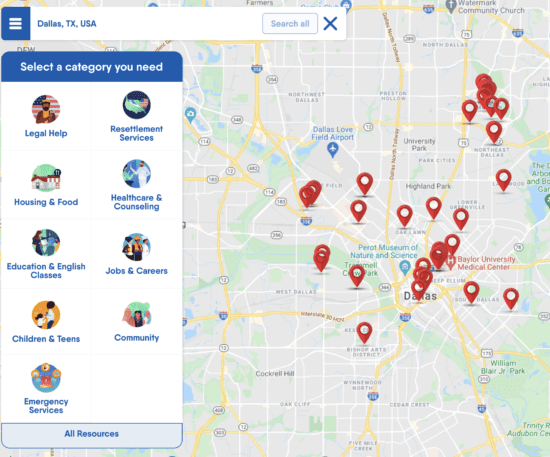What is an interpreter and translator?
Interpreters and translators communicate messages from one language to another. They help people talk and understand text in different languages.
Interpreters translate spoken and signed words. Interpreters can work in person, over the phone, or video.
Translators interpret written text. This includes text in documents, books, and videos.
Your right to have an interpreter and translator
You have the right to receive free translation and interpretation help in your language with most U.S. government agencies. This is free for people with limited English proficiency (LEP), and it is called Language Access.
If you don’t speak English fluently, ask for help. These offices cannot refuse to provide you with services because of your language.
Tips for asking for language support:
- Use an app like Tarjimly or Google Translate to communicate your needs.
- Ask if there are certain steps to take to ask for an interpreter or translations. Some may have you make the request online. Also, offices usually need to schedule an interpreter before your appointment.
- Share your preferred language or dialect. For example, say “I speak Spanish. I need an interpreter.”
- Share other preferences, such as having a female or male interpreter.
- Share if you will bring your own interpreter. They may have rules about who can interpret for you.
| You can also ask for language support if you are deaf, hard of hearing, or have a speech disability. Call 711 for free help communicating over the phone in all 50 states and territories. |
Interpreter services in government offices:
Immigration court
EOIR will provide you with a free interpreter at credible fear determinations and immigration hearings. Written materials are generally available in Spanish.
Civil and criminal court
Civil and criminal courts will arrange for free interpreters in court hearings.
Public benefit and service programs offer free interpreter services in person and over the phone, including for:
- Medicaid, Medicare, CHIP
- TANF and SNAP
- Social security
- Public housing
- Job centers
- 2-1-1 centers
Many legal aid providers offer free interpretation and translation services.
If you need language support at USCIS immigration offices, there are different rules about who can be your interpreter. If you are bringing your own interpreter:
- They must be 18 or older.
- They cannot be involved in your case, so it can’t be your lawyer or witness.
- They should be able to speak your language and English well, but they do not need to be a trained or certified interpreter.
Biometrics appointment
You must bring your own interpreter if you do not understand English. For this appointment, your interpreter can be your lawyer or another person such as a family member.
Asylum interview
If you need language support, you must bring your own interpreter to your asylum interview. Your interpreter cannot have a pending asylum case.
Credible fear interview
If you can’t finish your credible fear interview in English, USCIS will get a free interpreter for you.
Naturalization interview
USCIS may provide you with an interpreter if you take the citizenship test or oath in your language. You may also bring your own interpreter. You and your interpreter must complete Form G-1256 before your interview.
Green Card interview
You must bring your own interpreter to your Green Card interview if you need one. You and your interpreter must complete Form G-1256 before your interview.
Visa interview
U.S. embassies or consulates may offer interpreters at your visa interview. Contact your local office for more information.
Immigration detention
ICE must provide assistance to detained individuals who need help understanding English. Written materials and forms are generally translated into Spanish.
Deaf or hard-of-hearing support
If you need a sign language interpreter, USCIS will provide one, or you can bring your own.
Law enforcement agencies must offer telephone or in-person interpreters for people who need it.
Public hospitals provide free language support through bilingual or multilingual staff in-person services. Clinics provide phone and video interpretation and translation of medical documents.
Public schools have language support services for students who primarily speak a language other than English. This includes face-to-face interpretation or over-the-phone interpretation in multiple languages, including American Sign Language. School materials are also translated into multiple languages.
| Report a problem. If you do not get the language service you should, you can file a complaint. Ask the place that was supposed to help you how to do this. They have steps to look into what happened. You can also file a complaint with the U.S. Department of Justice. |
Finding your own interpreter or translator
Some places that are not part of the government may not offer translation help. If you need to find help yourself, you can:
- Reach out to a trusted family member or friend for support.
- Ask your local refugee resettlement agency for free help.
- Use free apps on your phone like Tarjimly and Google Translate.
- Get free help through organizations like Respond Crisis Translation.
- Hire a freelance translator or interpreter.
Tarjimly app
Tarjimly offers free translation support to refugees, asylum seekers, and aid workers in over 121 languages. In the Tarjimly app, you can connect to a volunteer translator and start a conversation. You can send messages, voice messages, photos, or make a phone call.
Google Translate
Google Translate is a machine language translation tool. It translates text and speech in over 100 languages in your browser or from the mobile app.
With Google Translate you can:
- Speak into the app and it will talk back.
- Translate conversations in real time.
- Handwrite or type text.
- Use your camera to translate text.
- Translate an entire web page.
| Google Translate is often not 100% accurate. The quality of translations may vary, depending on the translated language. |
Other free translation services
Respond Crisis Translation offers translation and interpretation support in 105 languages.
Refugee Translation Project offers translation support to refugees and asylum seekers in 16 languages.
How translations and interpretations work
Professional translators and interpreters have to follow certain rules.
Length
Professional translations and interpretation are not word for word. It may take more or fewer words and time to translate your language into English and vice versa.
Style
Interpreters can work in two ways. They can translate what is said right away (simultaneously), or they can wait and translate after a few sentences (consecutively).
Accuracy
Interpreters and translators must communicate exactly what is spoken or written without changing the meaning. They cannot add or delete information to ensure accurate translations.
Interpreters may ask you to clarify a specific word or phrase to make sure they understand you.
Confidentiality
By law, professional interpreters and translators must keep all your information confidential. They cannot share your information with anyone without your permission.
Tips for communicating with an interpreter
- Talk to the service provider, not the interpreter.
- Speak clearly and slowly, using short statements with 1-2 sentences at a time.
- Wait for the interpreter to finish before continuing.
- If you don’t understand something, let them know.
- Ask them to repeat or explain words.

Find legal help, English classes, health clinics, housing support, and more. Search a local map and list of services for immigrants in the USA with the app FindHello.
The information on this page comes from our partner Tarjimly, USCIS, LawHelp.org, and other trusted sources. We aim to offer easy to understand information that is updated regularly. This information is not legal advice.



